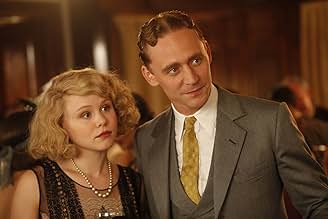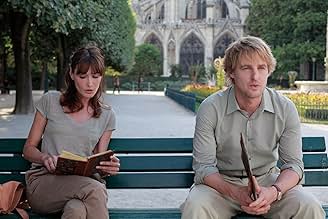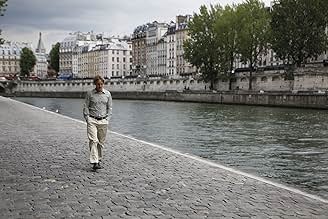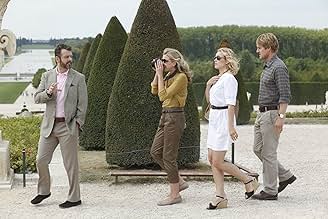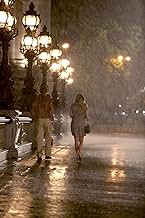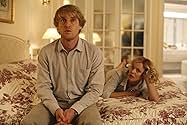While on a trip to Paris with his fiancée's family, a nostalgic screenwriter finds himself mysteriously going back to the 1920s every day at midnight.While on a trip to Paris with his fiancée's family, a nostalgic screenwriter finds himself mysteriously going back to the 1920s every day at midnight.While on a trip to Paris with his fiancée's family, a nostalgic screenwriter finds himself mysteriously going back to the 1920s every day at midnight.
- Won 1 Oscar
- 26 wins & 103 nominations total
- 1920's Partygoer
- (as Marie-Sohne Condé)
- Director
- Writer
- All cast & crew
- Production, box office & more at IMDbPro
Featured reviews
There are a lot of special features about this movie. The dialogue (script), the acting, the score, the cinematography.
Midnight in Paris provides a lot entertainment without essentially "going anywhere." It isn't an extraordinary story. It doesn't provide some deep meaningful message. It's merely a bunch of interesting dialogue mixed with outstanding acting put together to provide good entertainment.
The kind of entertainment I speak of in MIP isn't the ordinary type of "entertainment." It's a rare kind of entertainment and can only be found in certain movies. Pulp Fiction is the other prime example that springs to mind. Although very different in genre and script, there was one broad striking similarity I noticed between the two movies. They both have no purpose, no story (or at least, the "story" is used as a scapegoat to present the desired script in the movie), there basically isn't any real "reason" to see the movie. It's just about nothing. But what both movies succeed to do is just make you watch the movie, immerse yourself in it, provide you with a different kind of "comedy." It isn't comedy that makes you laugh out loud (for the most part) and it isn't failed comedy. It's the kind of comedy where you simply get subtle enjoyment from, you let out an occasional smirk or smile, but the smirk isn't necessarily in relation to the a specific comment in the movie, rather it's a smirk signifying your quiet enjoyment towards the film generally. You can sit there continuously for hours and days following repeated viewings of the film and not get bored simply because its so enjoying to watch. That's the kind of entrainment MIP offers and for the very same reason, it will attract negative attention from certain viewers, but not from me.
Next, the cinematography. Oh my gosh! I could have given this movie a 10 without the rest of the movie being so good. I, having visited Paris, for unfortunately not too long a period, fell in love with the city. It is the most romantic and beautiful city I have ever seen. It really is the city of love and all expectations were not only as good, but better. I hold this thought even though some friends I know of have had, well, not as great an experience as myself.
Woody manages to capture the beautiful presence of Paris like no other director. I felt like I was back in Paris and it sometimes managed to put a chill down my spine because of the amount of beauty I was both witnessing and remembering. I really can't say anymore about the cinematography except that it is the best, it is flawless, it is exceptional and if you have ever been to Paris and loved it, you'll definitely love this movie.
Moving onto the acting, I'll settle this briefly. Although MIP has a lot of very solid small roles (Rachel McAdams was very average, but I think that's how her character was intended to be), Owen Wilson is the complete stand out. Although I can't quote statistics, I think this may be the first movie Owen Wilson has been in which has scored and 8+ on IMDb. To put this bluntly, I'm not an Owen Wilson fan. I generally don't like his comedy. But in MIP I have never met any other actor who fits the lead role so perfectly. To put it metaphorically, Owen fits into MIP like a glove. I have never seen such an flawless representation of Woody Allen himself. Owen is Woody. And therein lies the perfection of his acting. He barely needs to act, because I know all he's doing is being himself and dishing out lines given to him, but it fits so perfect with a Woody image. All in all, MIP is Woody Allen movie, with a Woody Allen touch, a Woody Allen script, a Woody Allen cinematography and a Woody Allen leading actor.
Unfortunately, I can't express a very specific audience to which I would recommend this movie to. If you have been to Paris and loved it, chances are you will love it. It captures the beauty, the fashion, the culture and personality of Paris like it really is Paris. However, like I stated before, the dialogue in this movie and the "story" and "purpose" is something which will attract mixed feelings. I, for one, absolutely loved it. All I can say is that, if you agree with my comments above or if they touch an emotional nerve, then the chances of this movie doing the same to you is very high.
It is nothing too special. It doesn't provide a great message. It doesn't have a extraordinary story. But it provides for a rare kind of entertainment, coupled with exceptional cinematography and for these reasons, I cannot give any less than a 10.
Welcome to the world of Woody Allen as he has always loved it: nostalgic, romantic, imperfect, and full of hope. Midnight in Paris is one of his finest treatises on the lure and delusions of the past: Like Zelig it depicts other times, like Purple Rose of Cairo it uses magic realism to deal squarely with the present. Allen has another of his surrogates, this time Gil (Owen Wilson),who virtually experiences the past (the twenties) while dealing with the troublesome present.
Gil, engaged to marry Inez (Rachel McAdams), is with her and her parents on business in Paris where he hopes to work on his novel while he is still a successful Hollywood writer. Although she is a materialist who would like him to become wealthy to enjoy the life his parents are used to, he dreams of escaping the hack work of LA and living in the City of Lights for inspiration, just as his idols Fitzgerald and Hemingway did in the roaring twenties.
Well, the twenties roar back to him as he experiences their friendship and the mentoring of Gertrude Stein, among just a few of the many expatriate luminaries he meets through the magic of nostalgia. Just one of the Allen signature touches that make him the equal of great European directors such as Rohmer and Godard is opening the film with music that reflects the allure of the twenties, the romance of Paris, and his abiding love for this city: "Si Tu Vois Ma Mere" by Sidney Bechet combines jazz, the clarinet, the twenties, and Allen with a romantic nostalgia.
Owen Wilson catches the halting diffidence of the typical Allen persona without slavishly imitating him. Yet whatever little duplication Wilson employs endears as he sweetly visits his heroes, falls in love, and comes to terms with his writer's voice and his mismatched engagement. But that engagement is the troublesome present; the past offers the chance to experience history on a human level that only someone who writes for now and reveres the past can do.
The magic and the realism, both requiring hard work from the protagonist, lead to surprising understanding of human nature, the delusion of nostalgia and Paris, and hope for a present that brings love and inspiration.
"For all we know, Paris might be the hottest place in the universe." (Gil)
It's been at least a decade since I have enjoyed an Allen movie this much.
That said, Allen's rendition of those ideas feels fresh this time. Midnight in Paris is a sweet, fun romp through the art world of France. This light comedy may not have some of the heavier messages about adultery and art that previous Allen films have had, but Midnight in Paris is, nonetheless, an enjoyable exercise in allusion to the Lost Generation and artists of the 1920s.
Midnight in Paris begins with the same idea of a man, in this case a screenwriter named Gil played by Owen Wilson, searching for connection with the real world. The protagonist is clearly a projection of Allen's self, but no matter. Gil is engaged to the Inez, played by a blond Rachel McAdams who coincidentally (or is it?) looks like Scarlet Johansson from Vicky Cristina Barcelona. Inez bores Gil with her pretentious friends and spiteful parents, which ultimately causes Gil to seek inspiration on his own time by drunkenly wandering that streets of Paris. One night, he is invited into a car that takes him back to the 1920s where he meets his favorite writers and artists, something that eventually leads to a breakthrough in his work. A large supporting cast includes Kathy Bates, Allison Pill, Adrien Brody, Michael Sheen, and Marion Cotillard.
Allen's conception of Paris is just as romantic as the story itself. The film's physical look matches some of the complexities of the women in that it appears to be almost splashed in gold. It is, after all, the City of Lights. It's a beautiful movie that matches the pretty faces of its starring women.
Allen's screenplay leaps right off the page thanks to his cast, but this too is something that isn't unusual for a Woody Allen film. At his best, Allen picks actors that play their parts with a sense of realism that, when combined with some elements of the fantastic, charm the audience. Just about everyone here manages to do just this, with the exception of Rachel McAdams, who tries her hardest with an underdeveloped character. Marion Cotillard is the best of the cast (as per usual) in her role as Picasso's mistress. She's bursting with sexuality yet she's grounded in her ability to deliver her dialogue with her natural French accent.
Midnight in Paris is fantastique. In comparison to Woody Allen's previous tales of lust and spite, his newest film feels like a dessert rather than a filling entree, yet this is exactly how a good, highbrow summer movie should be. The cast shines just as bright as the lights at the top of the Eiffel Tower and Allen proves himself worthy of his place in society as a master director once again. By no means a classic, Midnight in Paris is a pretty little diversion, one that is grounded in a theatrical gimmick that totally works every time. This, along with The Tree of Life, will be one of a few summer movies that will dazzle visually (without explosions) and somehow manage not to insult the viewer's intelligence.
Did you know
- TriviaTom Hiddleston received a letter from Woody Allen, along with fifteen pages of the script, offering him the role of F. Scott Fitzgerald. "It was three sentences long," Hiddleston told Entertainment Weekly. "Dear Tom, I'm making a movie in Paris this summer. I attached some pages. I'd love for you to play the role of Scott." Hiddleston now has the letter framed and hanging up in his home office.
- GoofsZelda Fitzgerald says to Gil, "You have a glazed look in your eye, stunned, stupefied, anesthetized, lobotomized..." Lobotomies were introduced in 1935.
- Quotes
Gil: Would you read it?
Ernest Hemingway: Your novel?
Gil: Yeah, it's about 400 pages long, and I'm just looking for an opinion.
Ernest Hemingway: My opinion is I hate it.
Gil: Well you haven't even read it yet.
Ernest Hemingway: If it's bad, I'll hate it because I hate bad writing, and if it's good, I'll be envious and hate all the more. You don't want the opinion of another writer.
- ConnectionsFeatured in Ebert Presents: At the Movies: Episode #1.18 (2011)
- SoundtracksSi tu Vois ma Mère
Music by Sidney Bechet
Lyrics by Sidney Bechet and Jean Broussolle
Performed by Sidney Bechet
Details
- Release date
- Countries of origin
- Official sites
- Languages
- Also known as
- Medianoche en París
- Filming locations
- Church of Saint-Etienne-du-Mont, Montagne Sainte-Geneviève, Paris 5, Paris, France(steps where Gil sits before vintage Peugeot arrives)
- Production companies
- See more company credits at IMDbPro
Box office
- Budget
- $17,000,000 (estimated)
- Gross US & Canada
- $56,817,045
- Opening weekend US & Canada
- $599,003
- May 22, 2011
- Gross worldwide
- $151,487,383
- Runtime1 hour 34 minutes
- Color
- Sound mix
- Aspect ratio
- 1.85 : 1







